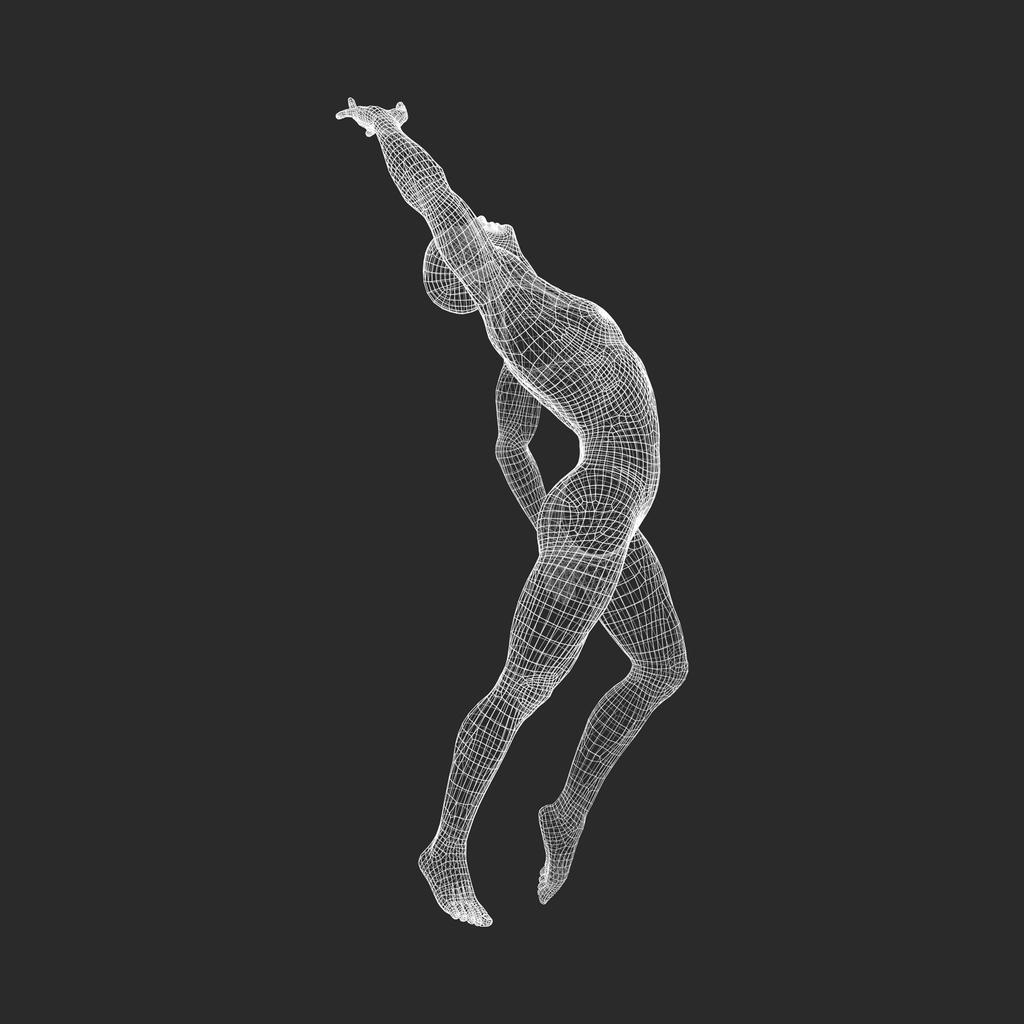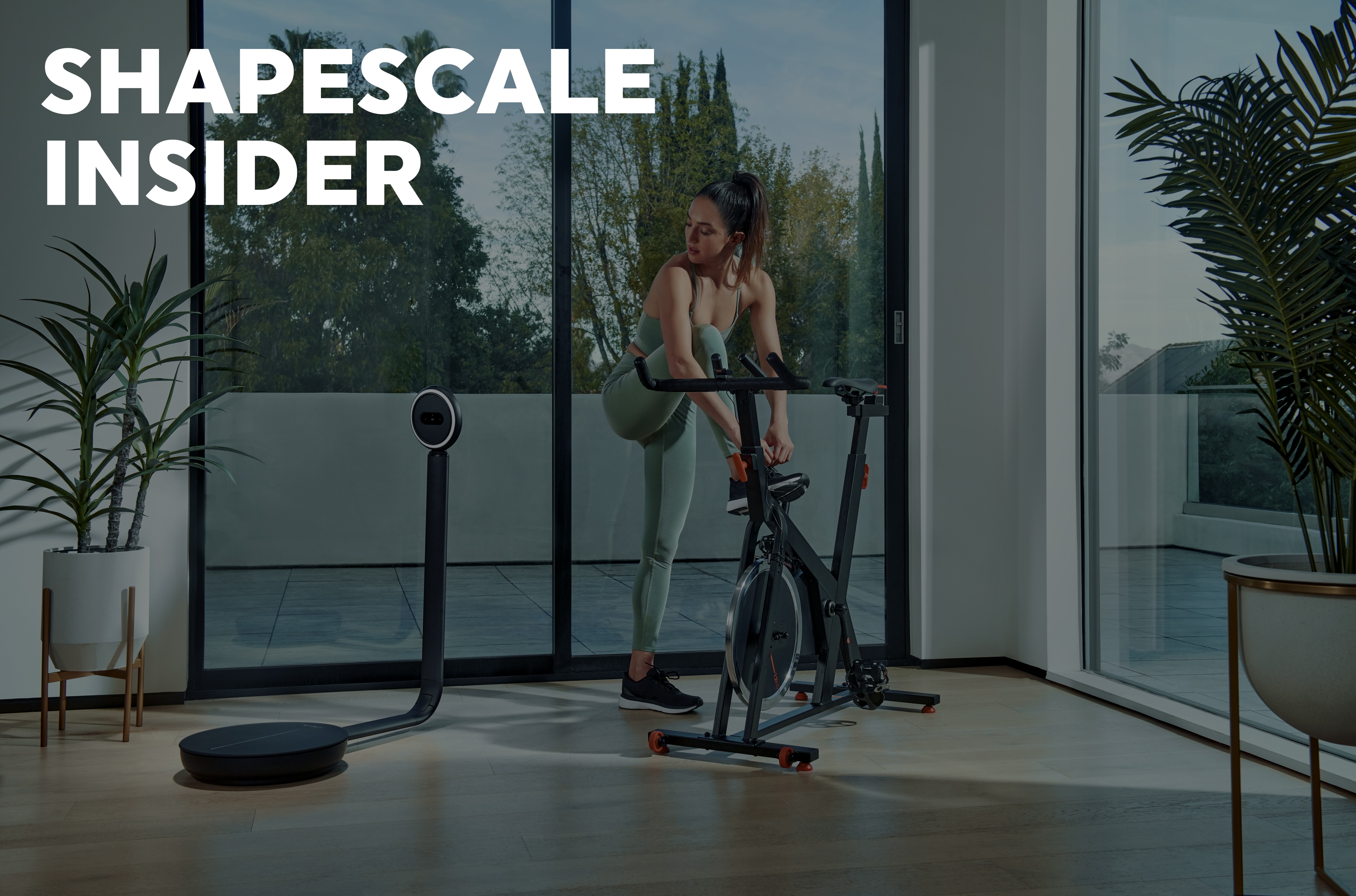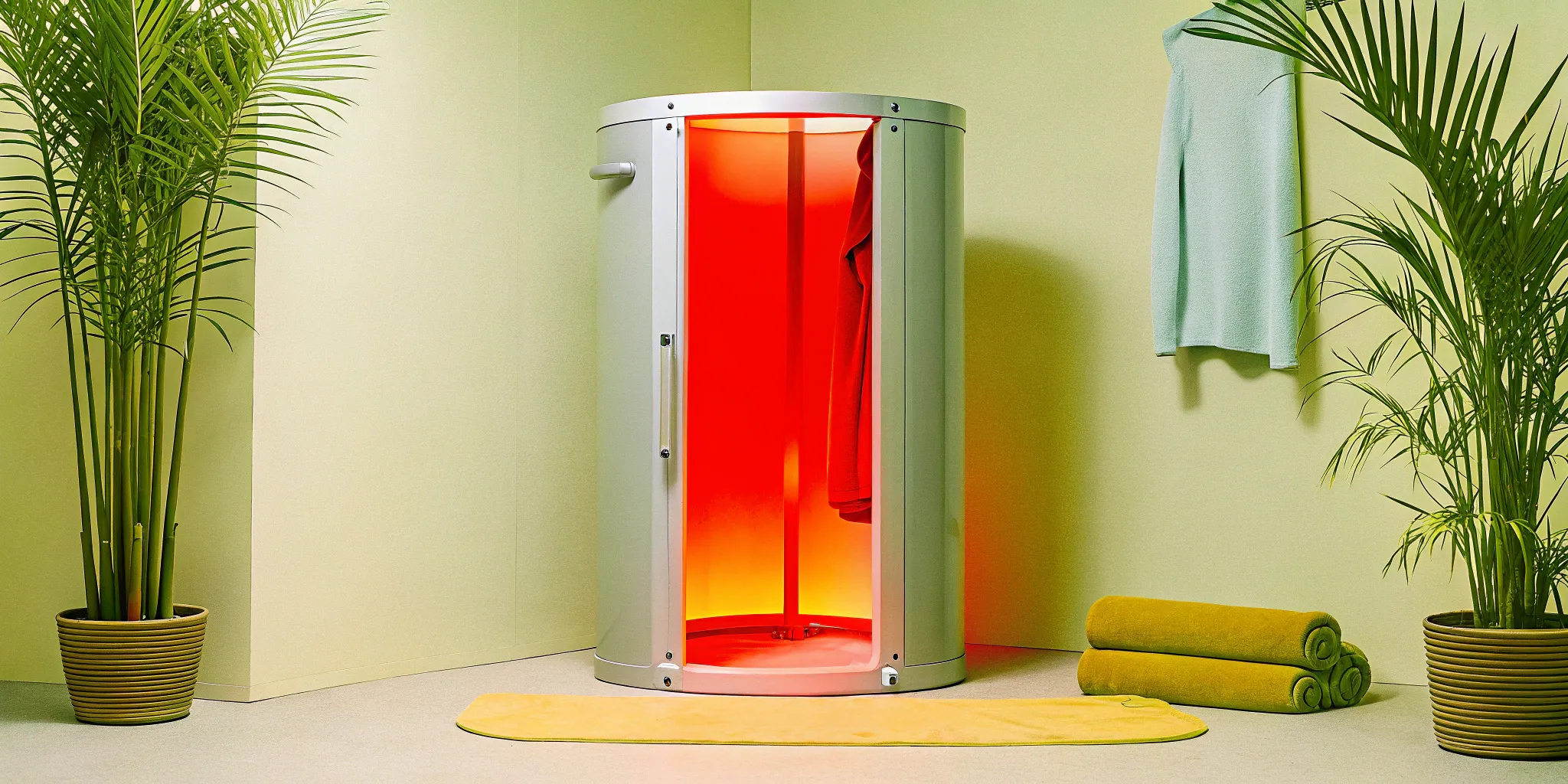ShapeScale vs Styku: Complete 3D Body Scanner Comparison 2025 (Features Compared & Business Applications)
.jpg)

Heading 2
Heading 1
Heading 3
Heading 4
Heading 5
Heading 6
Lorem ipsum dolor sit amet, consectetur adipiscing elit, sed do eiusmod tempor incididunt ut labore et dolore magna aliqua. Ut enim ad minim veniam, quis nostrud exercitation ullamco laboris nisi ut aliquip ex ea commodo consequat. Duis aute irure dolor in reprehenderit in voluptate velit esse cillum dolore eu fugiat nulla pariatur.
Block quote
Ordered list
- Item 1
- Item 2
- Item 3
Unordered list
- zz
- Item B
- Item C
Bold text
Emphasis
Superscript
Subscript
As a health and wellness professional, you're constantly searching for innovative ways to enhance your services and improve client outcomes. 3D body scanning offers a compelling solution, providing detailed insights into body composition and progress tracking. But with various systems available, choosing the right one can be a overwhelming. This guide reveals how ShapeScale redefines what’s possible in the 3D body scanning industry, contrasting its advanced capabilities with other market solutions like Styku.
At a glance:
- ShapeScale is a compact product with award winning design, app-integrated functionality, three scanning modes, color-coded heatmaps for progress tracking, and clinical grade accuracy–all starting from $199/month with everything included.
- Styku is a two-piece equipment that relies on Windows PC, desktop-only software, monochrome avatar option, basic chart displays, and circumference-based estimation methods—priced at $6,000-$10,000 upfront plus ongoing software fees at $150-200 a month.
3D Body Scanners Compared: Design and Hardware
.png)
ShapeScale isn’t just a body scanner–it’s a conversation starter that instantly draws people in. When activated, the scanner comes alive with an illuminated head and friendly audio guidance. Its scanner rotates 360 degrees around the user, extending up to 6 feet to capture every detail.
Using a colored camera, it delivers precise measurements that clients can trust. Built-in automatic user recognition means returning clients can simply step on and start scanning without staff assistance. This one-of-a-kind technology transforms routine progress tracking into an enticing, high-tech experience that clients actually look forward to–and are happy to pay premium prices for.
.jpg)
Recently honored with the prestigious Red Dot Design Award and Good Design Award, ShapeScale stands at the forefront of design excellence in health tech. It also stands as the most compact 3D body scanner on the market, fitting into any wellness space and folding down for easy storage–perfect for busy facilities or mobile services.
While ShapeScale’s robotic design creates visual interest and improved functionality, including high resolution capture and high accuracy results, Styku takes a different approach with its platform-based system. Styku rotates the user on its platform that requires them to stand in place while a camera captures their body. On this rotating platform, people subtly swayand balance causing local body motion up to ~2 cm during a single scan and effectively “falsifying the results” (https://jrnl.3dbody.tech/papers/2024/2448naake.pdf).
The two-piece system demands a larger setup area plus additional space for a dedicated Windows computer with multiple cable connections. Furthermore, the complex installation process often requires technical support to configure.
3D Body Scanners Compared: Scan Results
ShapeScale offers three distinct scan modes to match different client preferences and business needs.

Photorealistic 3D Mode captures lifelike detail—clients see themselves in their actual skin detail. Watching their waist shrink or shoulders broaden in photorealistic detail creates emotional investment that transforms one-time visitors into long-term committed clients.
Mesh 3D Mode displays the body in a clean, simplified view that emphasizes muscle definition and structural changes—perfect for clients who prefer a more analytical approach.
Measurements Only Mode strips everything down to the numbers for more body-conscious clients who want data without visuals.
But here's where ShapeScale truly shines: AR capabilities that transform the patient experience. Using our app, you can place your patients' life-sized 3D body model right in the consultation room, walk around it, examine transformations from every angle, and show progress in an immersive way no other scanner offers.
Styku only offers a single visualization option of 3D solid color avatars, presenting the body as a mannequin-like form with no realistic appearance.
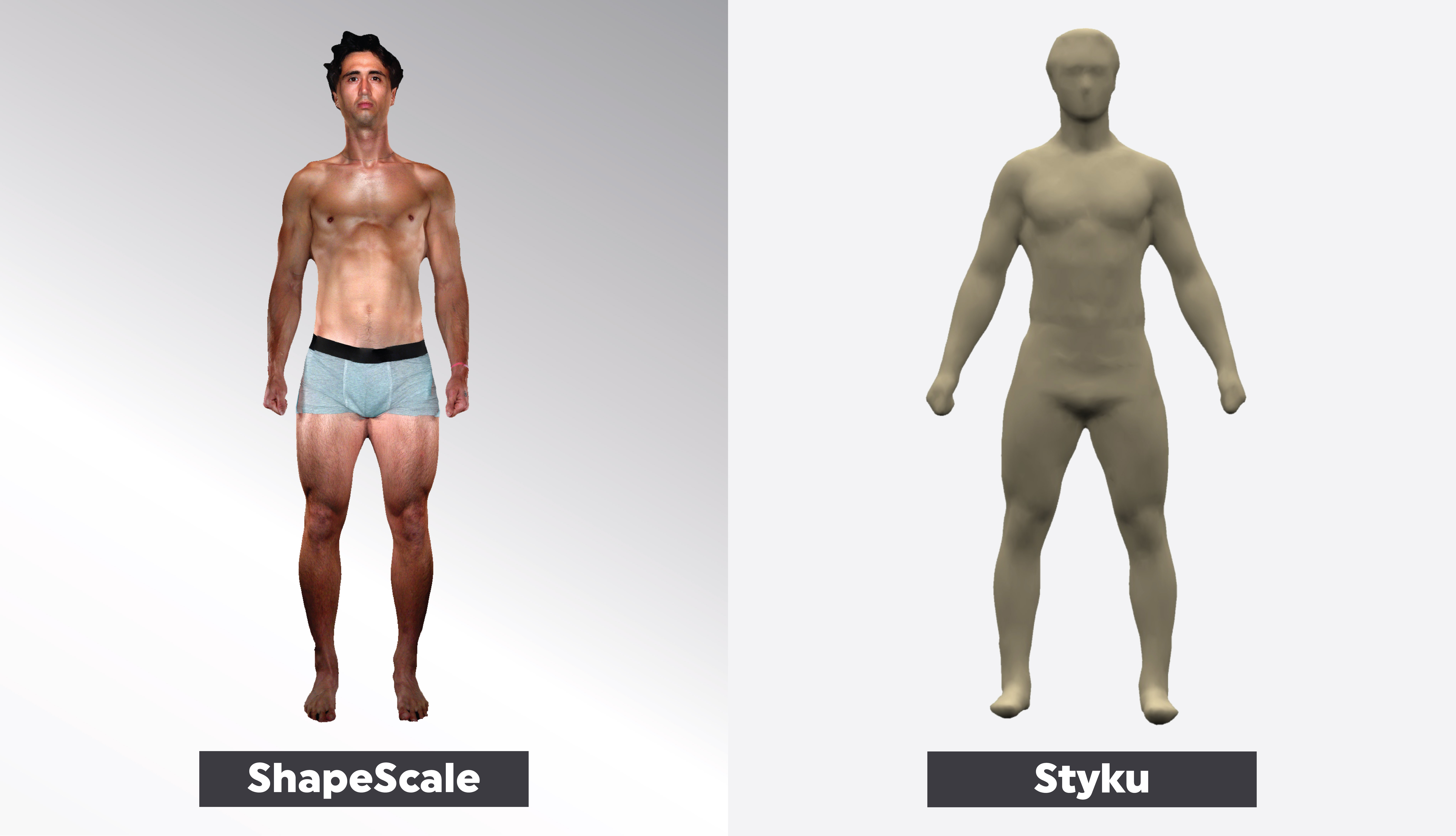
As mentioned above, ShapeScale also offers a Mesh 3D scan option that features the user in detailed 3D body visualization with clear surface definition and professional-grade clarity. The Mesh 3D mode highlights muscle definition and body contours in an intuitive way, you can zoom into ever body part and follow the change in muscle definition from every angle.
Styku’s avatar displays undefined texture compared to ShapeScale's detailed surface mapping, suggesting limitations in their 3D body scan data capture. This lack of surface detail means users receive a less precise representation of their actual body shape and contours, indicating the gap in underlying measurement accuracy.
3D Body Scanners Compared: Software and User Interface
The ShapeScale app is available on iPad, iPhone, as well as Mac to both clients and business practitioners alike free of charge. Standing apart with its mobile-first approach, ShapeScale recognizes that clients expect easy app navigation. The app makes receiving scans effortless, clients can easily navigate through their results with intuitive swipes and taps.
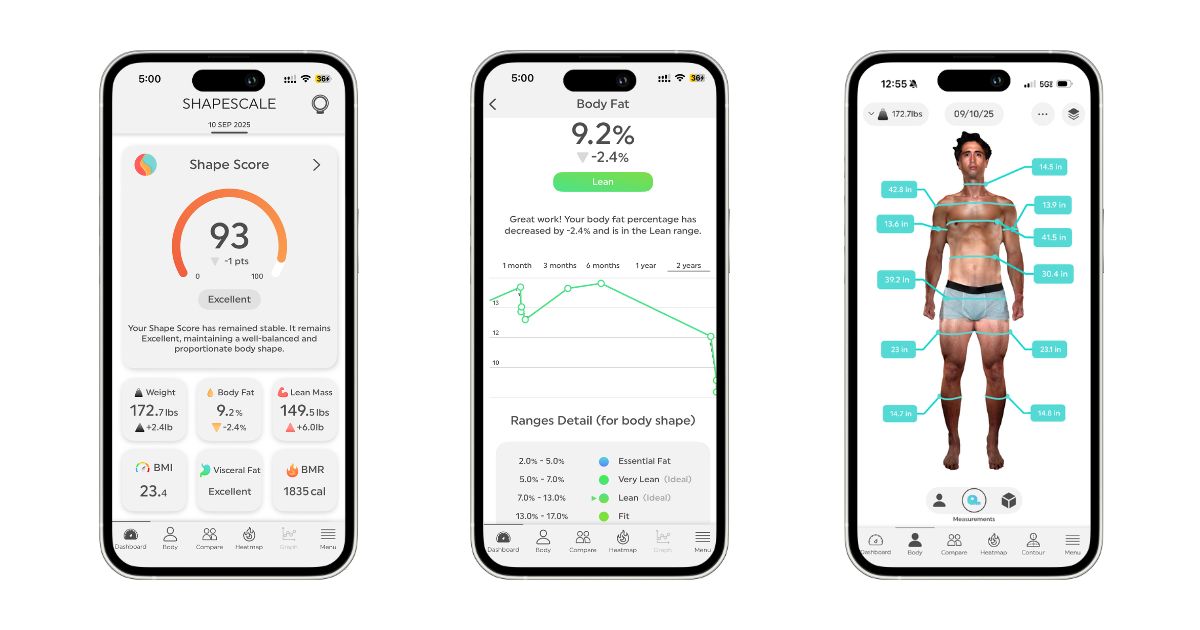
The interface doesn’t just show numbers; it actually explains what each measurement means and how it impacts their health journey. Clients can see their 3D avatars changing over time, watching specific body parts transform through detailed before-and-after comparisons that make progress motivating. Having results on their phones encourages clients to share them with friends and family, which attracts new clients to your practice.
Businesses get a client dashboard, which allows you to track multiple clients, view progress trends, and generate professional but straightforward pdf. reports–all from your phone or tablet. This means you can monitor your business and support clients from anywhere, not just when you’re sitting at a computer.
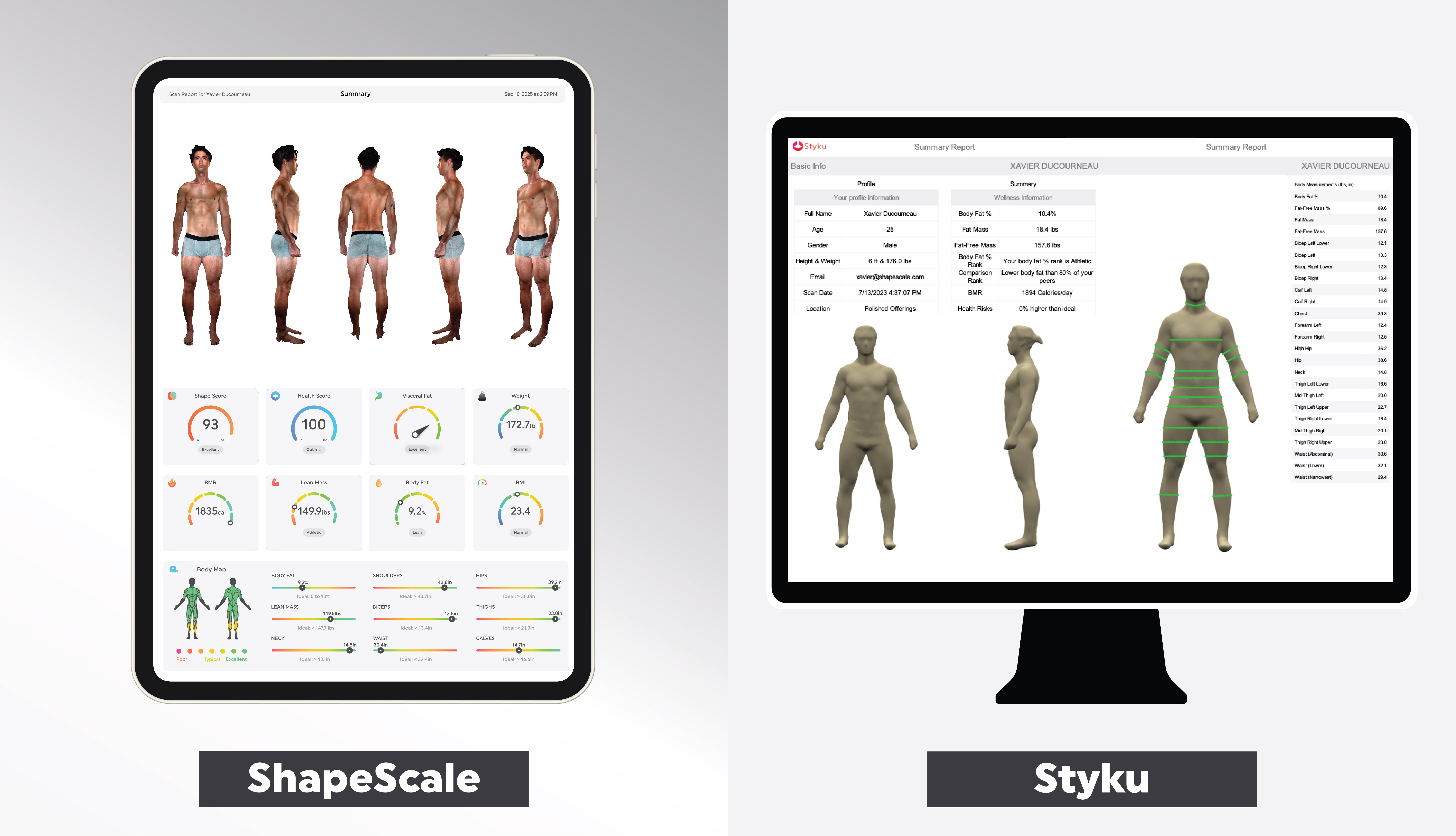
Styku operates primarily through Windows desktop software that requires software licenses for each computer. While they do offer a mobile app for clients, the system is desktop-first and scans must be processed through the Windows software before results can be synced to the mobile app.
The app is free for users to download and use for viewing current scan data, however premium features such as tracking measurements over time and comparing progress between scans is only available as part of a paid bundled software subscription. Additionally, there is no provider interface or dashboard available, and scans typically take 15-20 minutes to appear in the app after processing.
The user experience lacks the visual engagement that ShapeScale offers, with intuitive visualizations that make progress instantly understandable. The desktop software generates PDF reports that can be emailed to clients or printed, and due to the technical nature of these reports, staff typically need to be present to walk clients through their results.
3D Body Scanner Compared: Measurements & Analytics
Both scanners capture comprehensive body measurements, but they differ in depth and intelligence.
ShapeScale provides 40+ measurements across your entire body, plus full body composition analysis including body fat percentage, visceral fat, lean mass and Appendicular Lean Mass. What sets ShapeScale apart is Shape AI—our intelligent system that analyzes your body changes over time and provides personalized insights on what's working in your fitness or treatment plan.
Styku offers around 33 standard circumference measurements (chest, waist, hip, thigh, bicep, etc.) with body composition metrics and basic analytics like BMR, caloric targets, and waist-to-hip ratio. You can reposition measurement bands and add custom cross-sections as needed.
3D Body Scanners Compared: Measurement Accuracy

ShapeScale's AI analyzes your body's actual 3D shape to calculate body composition with clinical precision. As seen above, the Mesh 3D mode demonstrates the incredible level of detail our system captures, the same precision that enables our AI to deliver clinical-grade accuracy. We capture incredibly detailed 3D scans that map every muscle curve and body contour, creating a complete picture of your unique body geometry. Our deep learning model, trained on thousands of 3D scans and DEXA outcomes, predicts body fat percentage directly from your body shape. This precise geometric analysis achieves 98% accuracy compared to clinical DEXA scans (Dual-energy X-ray absorptiometry), making us one of the most accurate body composition technologies available.
Styku works differently, it measures basic body circumferences and then plugs those numbers into mathematical equations to estimate body composition. This indirect approach means you're getting educated guesses based on average body patterns, not precise measurements of your individual 3D body geometry.
3D Body Scanner Compared: Progress Tracking Features
Both ShapeScale and Styku capture comprehensive body insights including: weight, body fat percentage, lean mass, BMI, visceral fat, and detailed circumference and volume measurements from head to toe. Styku also provides posture analysis, bone mass measurements, and surface area calculations. These assessments can be valuable for some industries such as chiropractors.
Where they differ dramatically is how this data comes alive for your clients.
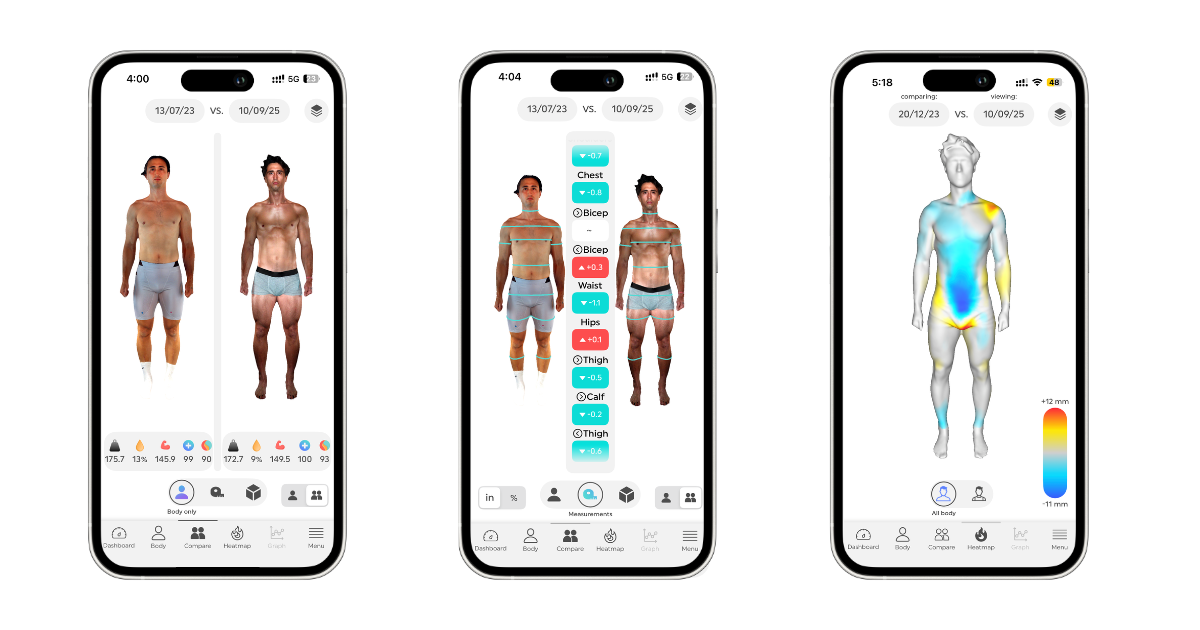
ShapeScale revolutionizes progress tracking with visual features that no other scanner offers. The side-by-side comparison tool lets clients see their photorealistic 3D body transformations in stunning detail. Even more powerful is ShapeScale's heatmap feature, which uses color-coded visualization to instantly show how your body has been changing. Blue and teal areas show where your have lost from, red and yellow areas highlight gains. This creates an intuitive visual story of the body’s transformation, which is not only easy to understand but is also motivating to clients.
.jpg)
Styku provides standard measurement tracking through basic before-and-after comparisons on desktop charts and graphs. The presentation relies on traditional spreadsheet-style displays and static side-by-side avatar comparisons that lack visual impact. Without color-coded progress indicators or photorealistic comparisons, clients must interpret their progress through numerical data rather than intuitive visual feedback, making it harder to stay engaged with their transformation journey.
3D Body Scanners Compared: Key Takeaways
Key Takeaways
- Design and Hardware:
- ShapeScale: Award winning 3D scanning device with automatic user recognition
- Styku: Rotation platform 3D scanner requiring complex installation
- User Interface:
- ShapeScale: Mobile-first experience for both clients and providers with intuitive interface and flexible progress scan sharing
- Styku: Desktop-first Windows software with PDF report sharing via email; mobile app available for clients only to view scans and track progress.
- 3D Body Scan:
- ShapeScale: Three modes including 3D photorealistic, 3D mesh, and 2D vector, AR capabilities
- Styku: 3D monotone avatar
- Progress Tracking Features:
- ShapeScale: Side-by-side photorealistic comparisons and color-coded heatmaps
- Styku: Basic charts and static avatar displays
- Measurement Accuracy:
- ShapeScale: 98% DEXA-validated precision from detailed body capture
- Styku: Circumference-based estimation methods
ShapeScale Integration Into Business
Adding ShapeScale to your business means choosing technology designed specifically for modern business needs. ShapeScale integrates seamlessly into existing workflows while creating new opportunities for client engagement and revenue growth and here’s how.
Price
ShapeScale makes premium technology accessible with flexible leasing from just $199/month or a single $9,780 purchase. Everything's included—hardware, software, warranty, and a 45-day risk-free trial that lets you test results before committing.
Ease of Setup & Training
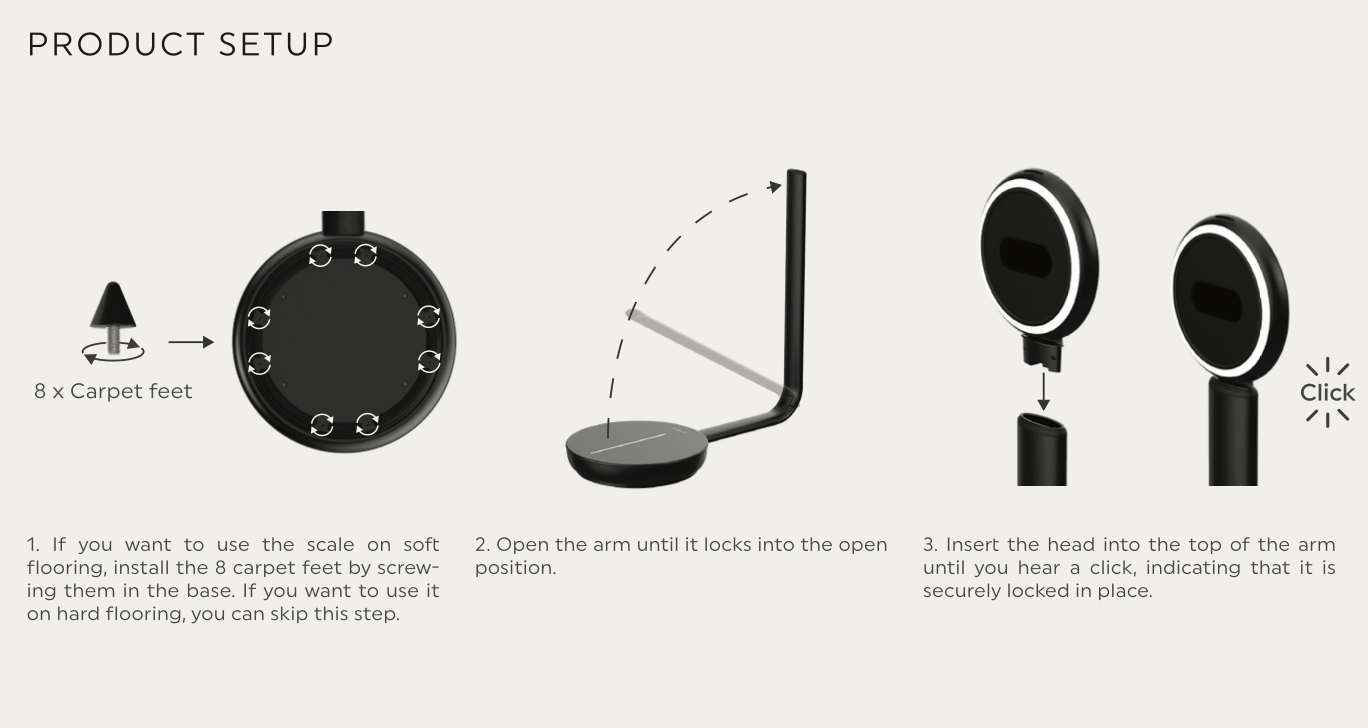
ShapeScale gets you scanning clients immediately with minimal setup time. The compact footprint fits into any wellness space and only requires a standard power outlet.
ShapeScale provides on-demand training, and 1-on-1 training options available upon request, ensuring that your onboarding process is as seamless as possible. Our intuitive app interface eliminates lengthy learning curves.
Marketing & Monetization
ShapeScale turns every scan into a marketing opportunity. Clients naturally share their scans using the ShapeScale app on social media, creating organic referrals without additional marketing spend. This helps to attract new clients while opening upselling opportunities for premium programs or per-scan pricing.
What Our Practitioners Are Saying
Don’t just take our word for it. Leading health and wellness professional across the country are seeing real results with ShapeScale.
Oakwood Precision Medicine
[add clip of him once we have it]
Dr. Jake Deutsch (Leading Physician & Healthcare Innovator & Founder of Oakwood Precision Medicine): “ShapeScale is the new gold standard when it comes to body composition analysis. The interactive ShapeScale app allows patients have access to the data and scans which certainly helps motivate clients and results in better achieved success. Honestly I depend on ShapeScale every day to provide precision medical care.”
Dr. Deutsch is a former owner of Styku - which ultimately he replaced with ShapeScale. This is what he answered when we asked him to compare the two devices: “Well first of all, the [ShapeScale’s] images are photographic vs Styku’s is kind of like a grey blob… additionally, the app sets it apart.. the quality of the data, the specificity of the data is far superior and just in terms of overall maintenance, customer service, like exceptional.”
Austin Plastic Surgeon
[add clip of him once we have it]
Dr. Johnny Franco (Board-certified Plastic Surgeon & Recognized Educator): “ShapeScale has truly revolutionized how we guide patients through their weight loss journey. It makes it so much easier for them to visualize their transformation and track progress—because it’s no longer just about losing weight. It’s about reshaping their entire life. With detailed body composition scans, ShapeScale allows us to target and enhance every step of the journey, giving patients a clear, motivating picture of their success.”
PepFit Health & Wellness
Ashley (Founder of PepFit Health & Wellness): "The technology attracts new clients impressed by its superior data quality compared to other scanning systems. Many initially book just for a ShapeScale assessment after seeing friends' results." This demonstrates how ShapeScale's visual appeal creates a natural marketing funnel that converts curiosity into paying customers.
PepFit Health & Wellness Client: "Coming in and doing the ShapeScale was like a reward. The anticipation of seeing changes turned what could have been a clinical experience into something I eagerly anticipated." When clients look forward to scanning rather than dread it, retention becomes automatic.
Innovaes Regenerative Sciences
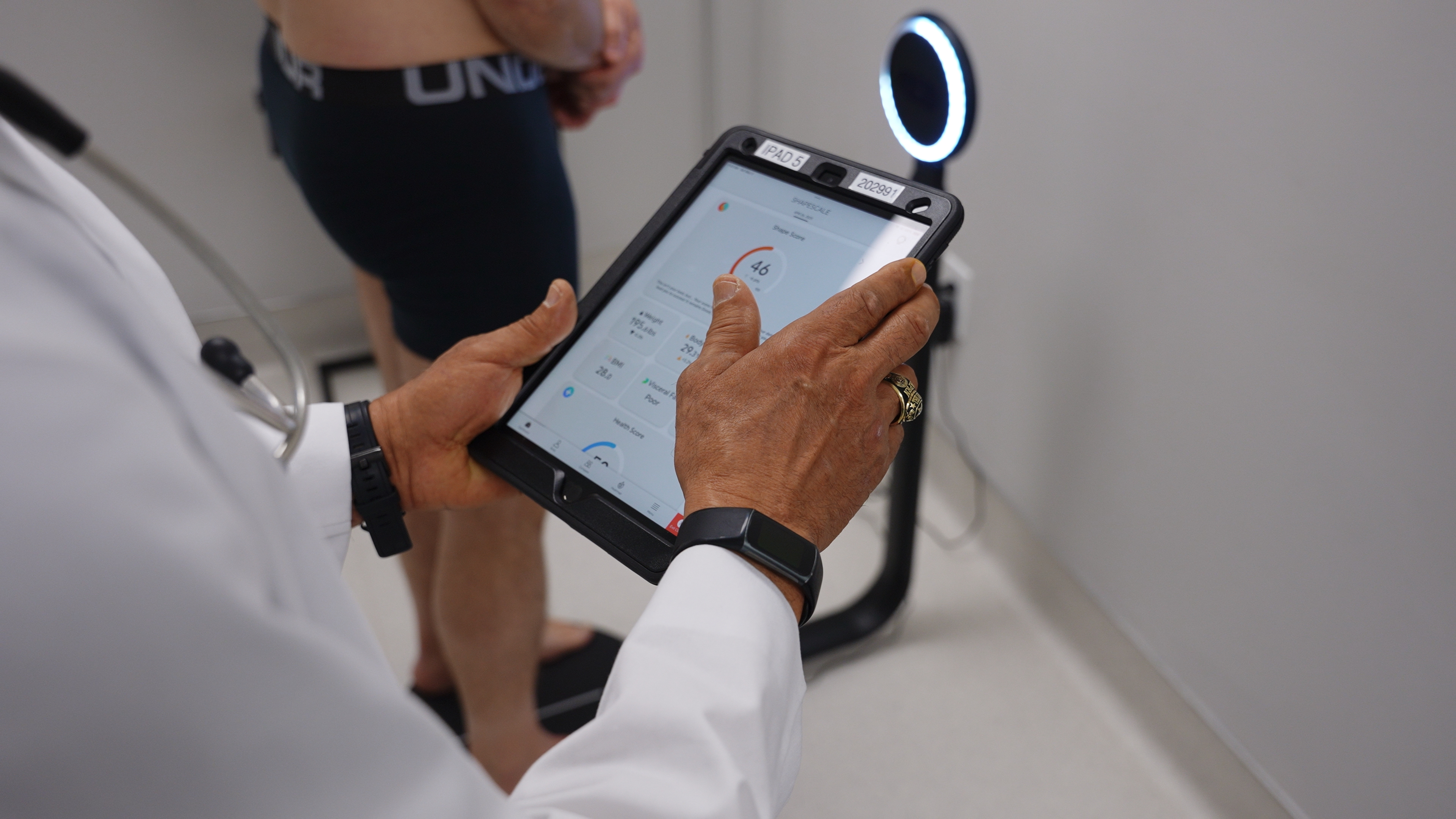
Trina Barr (Innovaes Med Aesthetics): "ShapeScale provides visible, tangible, absolutely undeniable metric of proof that was missing from our practice."
What Users are Saying About Styku
To give you the full picture, here's what we're hearing about Styku. The most common feedback is about inconsistent measurements—users report their body fat percentage can swing by 5% or more between scans just weeks apart, making it hard to track real progress.
On the business side, gym owners note that Styku requires an ongoing monthly subscription fee (around $100) on top of the initial purchase price, which can make it challenging to see a return on investment. These are worth considering as you decide which scanner is the right fit for your practice.
Ready to see the ShapeScale Difference?
Book a live demo today and discover how ShapeScale's photorealistic scans, intuitive mobile app, and advanced progress tracking can elevate your business.
Schedule your demo now → Book a live demo today

